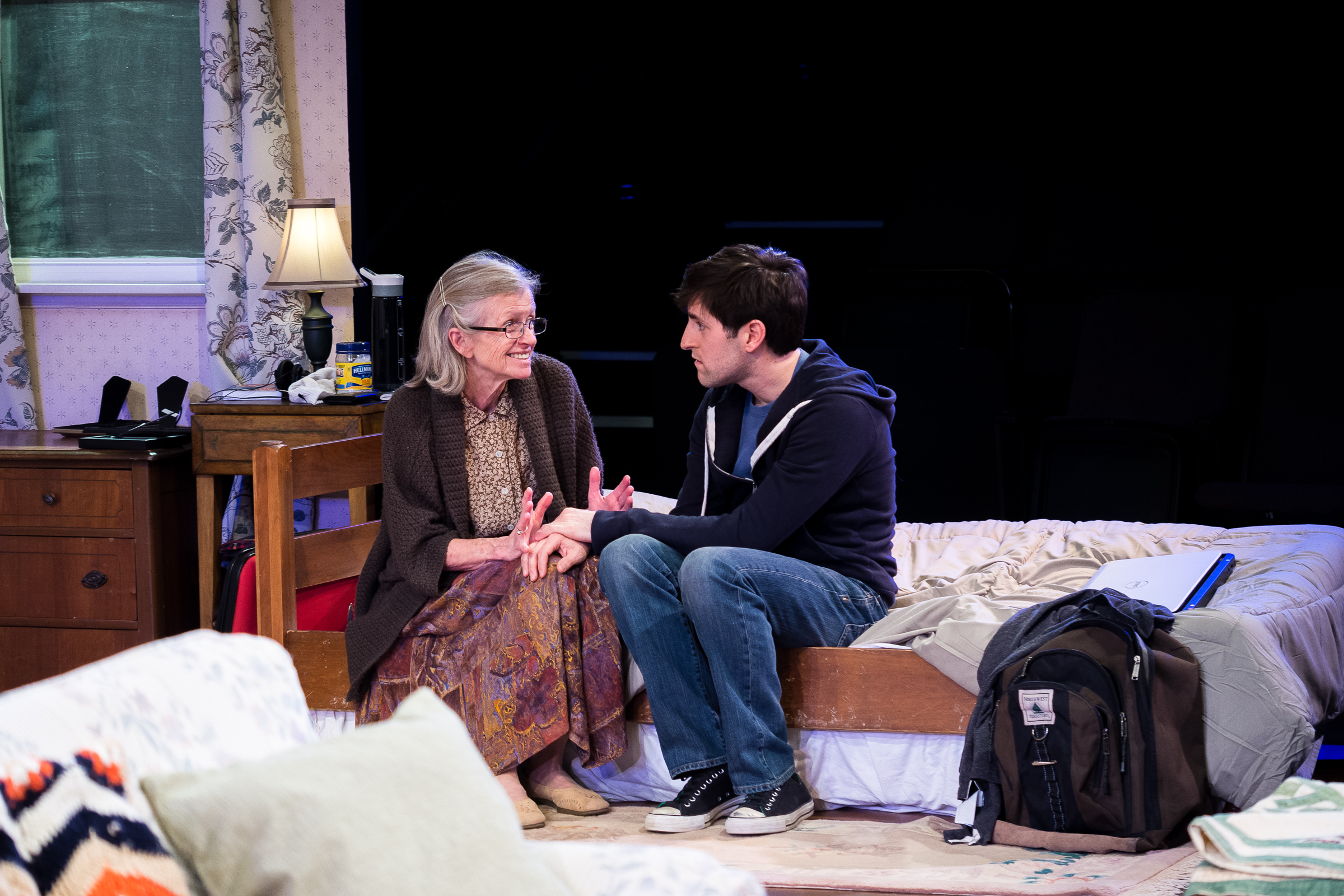Review of The Revisionist, Playhouse on Park
By pairing David, a twenty-something author from New York, with Maria, a Holocaust survivor in contemporary Poland, Jesse Eisenberg’s The Revisionist guarantees itself a certain relevance. At a time when those who lived through the Holocaust are dying off and a younger generation is growing up largely ignorant of what actually happened, the play keeps alive what could be called a necessary historical sense. With its intergenerational dynamic, The Revisionist successfully dramatizes how difficult communicating can be between those born in the first half of the twentieth century and those, born in the second half, who have come of age in the twenty-first century.
Maria (Cecelia Riddett), David (Carl Howell) (photos by Curt Henderson)
For too much of its running time, that seems to be the play’s entire point, a comic mismatch of intentions that aren’t quite funny or disorienting enough to justify their belaboring. In the later scenes, the revelation we’ve been waiting for arrives to make a stronger point—about family and remembrance and debt—that gives the play an uneasy resolution. The play’s dramatic arc, while not always as well-developed as it might be, mostly works, and Sasha Bratt’s production at Playhouse on Park maintains a quizzical and bemused tone that keeps us interested.
Maria (Cecelia Riddett) is an elderly Polish woman living in an apartment she treats as a shrine to her family, many dead and gone, others—like David’s grandfather—relatives who escaped to America. David (Carl Powell), Maria’s second cousin, is the author of a reasonably successful Young Adult novel (a political allegory that got reviewed, though not favorably, in the New York Times), who is trying to revise his latest manuscript for publication. He has come to her apartment in Poland as a last ditch refuge from his distracting life in New York. He needs a writer’s retreat, and finds instead a lonely relative poised to smother him with attention and chatter.
As an actor, Eisenberg is best-known in movies for playing somewhat quirky young men, intense with intelligence and often misguided. In the initial production of The Revisionist, he played David himself, paired with Vanessa Redgrave in a performance that earned raves. The performances in the Playhouse on Park production are strong and well-matched. As neither character is entirely likeable, we expect some development that will firmly tip the scales one way or the other, or that will lead to a happy rapprochement. We may warm to either, both, or neither character, but we do come to understand them better, whether or not they ever really understand each other.
David (Carl Howell), Maria (Cecelia Riddett)
Cecelia Riddett’s Maria is the more readily likeable, but she isn’t someone easy to be with, if only because her expectations are so high. She lives a quiet life, mostly punctuated by watching CNN and answering the phone—it’s always a telemarketer. Her right-hand man is a taxi driver named Zenon, nicely played as both easy-going and scary by Sebastian Buczyk, who drives her, carries her groceries, and, in one scene, tends her in a more intimate manner. Maria lets David use her own bedroom, while assuming a connection that, she believes, family members should have even if they’ve barely met (she saw David when he was a child; he doesn’t remember it). Her effort to coddle him is the kind of thing that would drive away someone his age, even if they had more of a family backstory.
Zenon (Sebastian Buczyk), David (Carl Howell)
David, for his part, is the epitome of the guest who is only there to suit himself. Bratt and Powell wisely don’t make David an Eisenberg clone, but rather play him as a youthful and insecure success, in a tone that perfectly suits his demographic. He’s used to taking himself seriously and knowingly descends to Maria’s level when his curiosity gets the best of him. He’s a chronic pot-smoker but never shows the stoner’s typical bursts of hilarity and depth. David is more of a latter day Woody Allen character, apt to feel put-upon and unappreciated, expecting consideration simply for the difficulty of being himself. Scenes in which the play seems to call for broad situation comedy—as when David walks in on Zenon shaving Maria’s legs, or when David gets his jollies having Zenon misuse American expletives—tend to be low key, here, as if the production knows such moments fall flat without a laugh-track.
And that’s the weakest aspect of the play: it has only a scatter-shot idea of how to make the situation amusing, so that much of what we see is simply working its way toward the Big Reveal. That aspect, full of the backstory of Maria’s life under the Nazis and just after, makes sense of her assertive effort to claim kin, and, in its outcome, takes aim at the worst of David right about the time we’ve come to accept him. The way people often do with family.
A prickly comedy aiming at deeper themes, The Revisionist works best as a cautionary tale about the ways to abuse a host and mislead a guest, and how sharing confidences is not a heart-to-heart if the hearts concerned never quite align.
Maria (Cecelia Riddett), David (Carl Howell)
The Revisionist
By Jesse Eisenberg
Directed by Sasha Bratt
Sound Designer: Joel Abbott; Scenic Designer: Emily Nichols; Costume Designer: Kate Bunce; Lighting Designer: Marcus Abbott; Stage Manager: Corin Killins; Dialect and Language Coach: Sebastian Buczyk; Properties and Set Dressing: Pamela Lang & Eileen O’Connor
Cast: Sebastian Buczyk, Carl Howell, Cecelia Riddett
Playhouse on Park
April 11-29, 2018






